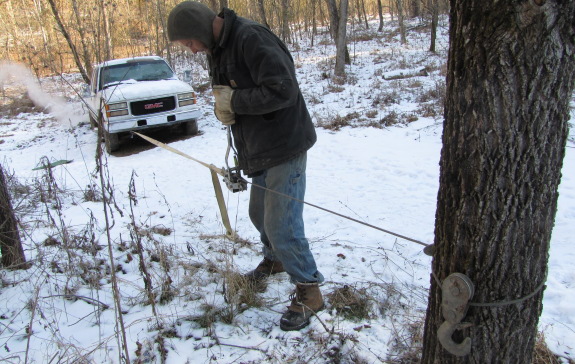
8000 pound hand winch failure

We tried hand winching the
truck out of trouble last week but just couldn't get it to budge more
than a few inchs.
The
winch is rated at 8000
pounds, which may have been enough if gravity wasn't working against us
with the incline. Usually we manage to creep forward with a combination
of me cranking on the winch and Anna easing forward, but that was with
a truck about half the size of this one.
Want more in-depth information? Browse through our books.
Or explore more posts by date or by subject.
About us: Anna Hess and Mark Hamilton spent over a decade living self-sufficiently in the mountains of Virginia before moving north to start over from scratch in the foothills of Ohio. They've experimented with permaculture, no-till gardening, trailersteading, home-based microbusinesses and much more, writing about their adventures in both blogs and books.
Want to be notified when new comments are posted on this page? Click on the RSS button after you add a comment to subscribe to the comment feed, or simply check the box beside "email replies to me" while writing your comment.

At first when I read your comment, I thought, "Of course you're right! That's why Mark felt like the winch was straining and decided not to risk it." We do usually keep the line on that end doubled up by connecting that hook back onto the winch. (We extended it out because it didn't quite reach the tree otherwise.)
But then I thought more about it, and the line on the other end of the winch is not doubled up. Surely that would be the weakest area, and doubling up the line on the other end wouldn't make it any weaker, would it? (Roland?)
I think Tim is right. Doubling up the steel cable would make it into a gun tackle, giving twice the leverage.
Think about it like this; If the steel cable is doubled (instead of single), you have to winch two inches of cable to move one inch (for the same amount of work). So the force on the lever is halved.
Strength should not be a big issue; it is a general engineering standard to design stuff for three times the nominal load.